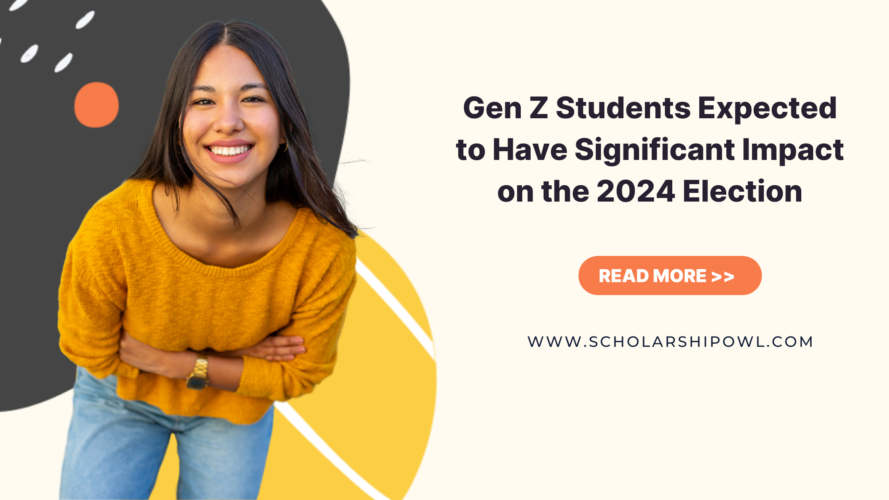In August 2024, ScholarshipOwl delved into learning more about how the youth vote may impact the results of the 2024 election. Two surveys were conducted:
- One survey investigated the issues that Gen Z voters care about the most, and also examined expected voting behavior;
- The other survey focused on how respondents identified themselves – as liberal or conservative.
Given how close the 2024 election is expected to be, many predict that young voters will have a sizeable impact on the election – perhaps tipping the scales in Democratic candidate Kamala Harris’ direction. Recent polls support this:
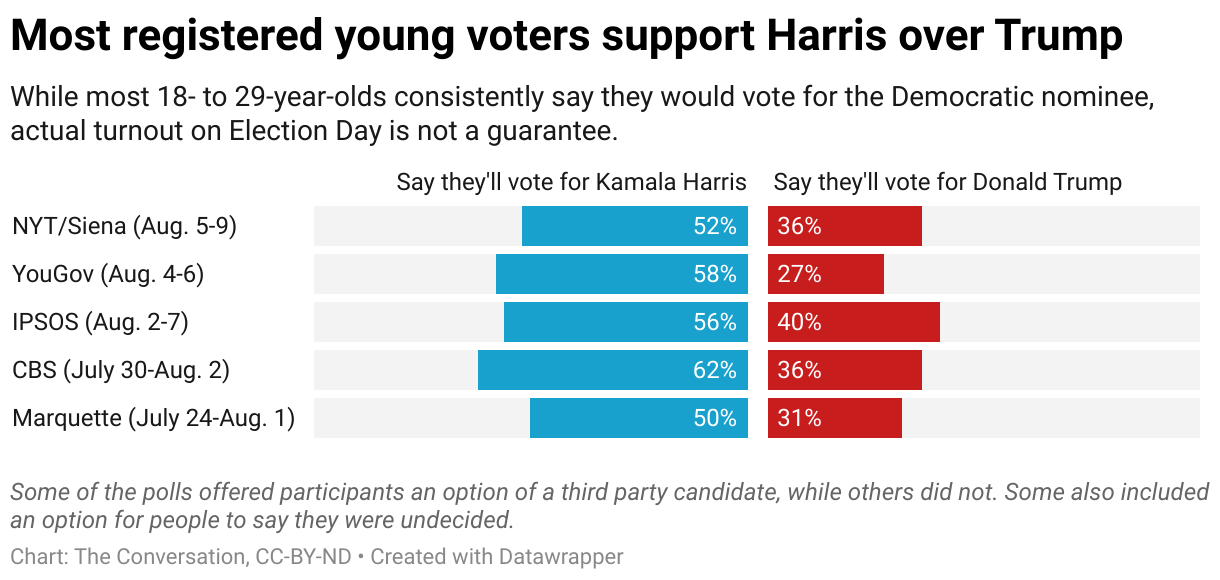
Win more scholarships with less effort
Simplify and focus your application process with the one-stop platform for vetted scholarships.
Check for scholarships
The ScholarshipOwl surveys are unique in that several thousand students participated, whereas in the above polls, the segments were much smaller, with the NYT/Siena, YouGov, IPSOS and Marquette polls all having fewer than 2000 participants, while the CBS poll had just over 3100 participants.
Issues and Voting Behavior Survey
In August 2024, ScholarshipOwl surveyed 12,090 high school and college students on the ScholarshipOwl scholarship platform to learn more about the issues they care about and how likely they are to vote in the 2024 election.
Among the respondents, 62% were female, 37% were male, 1.5% identified themselves as a different gender identity or preferred not to respond to the question. Nearly half (45%) were Caucasian, 24% were Black, 18% were Hispanic/Latino, 7% were Asian/Pacific Islander, 2% were American Indian/Native American and 5% selected “other” or preferred not to respond to the question.
Nearly one-third (30%) of the respondents were high school students, with the vast majority high school seniors; well over one-half (58%) were college undergraduate students, primarily college freshmen and college sophomores; 9% were graduate students and 4% identified themselves as adult/non-traditional students.
Qualifying Question – Are you eligible to vote in the 2024 U.S. Election?
We began the survey by asking a qualifying question, as we wanted to focus on students who were eligible to vote in the 2024 election. We asked students, “Are you eligible to vote in the 2024 U.S. Election?
- 78% (9395) said yes
- 22% (2695) said no
We then asked the 9395 eligible voters to respond to additional questions.
How likely are you to vote in the 2024 election?
- 75% said they were extremely likely to vote
- 18% said they were somewhat likely to vote
- 4% said they were not very likely to vote
- 3% said they don’t plan to vote even though they are eligible to do so
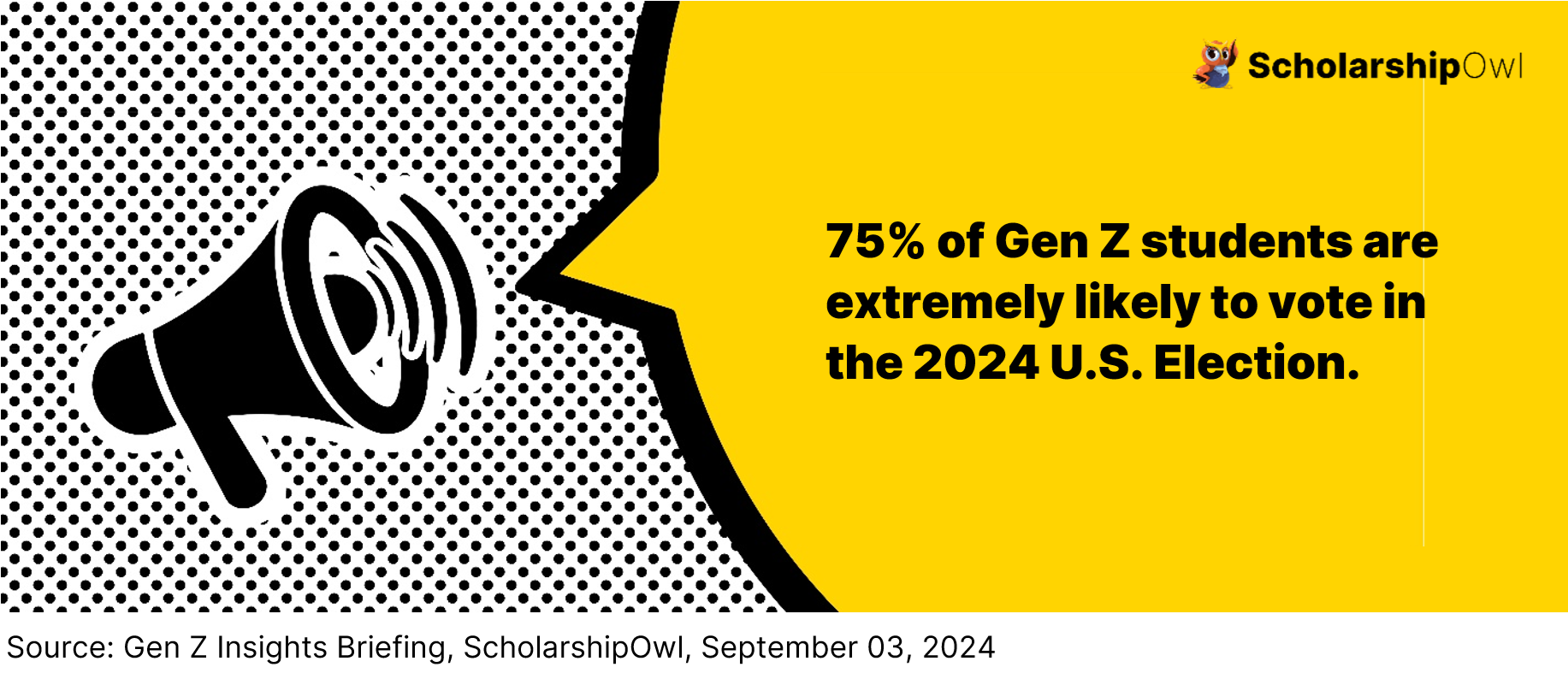
Which of the following policy issues will be most central to your 2024 voting choices? Select all that apply.
The vast majority of respondents selected multiple issues, indicating that several concerns will be top of mind when they vote this year.
- Student loan debt and college affordability: 73%
- Inflation / cost of goods: 72%
- Jobs and the economy: 64%
- Healthcare: 54%
- Affordable housing / homelessness: 52%
- Taxes / government spending: 49%
- Social justice / civil rights: 48%
- Mental health / addiction: 47%
- Reproductive rights: 46%
- Gun violence: 39%
- Crime / public safety: 36%
- Climate and the environment: 34%
- Immigration policy / immigration reform: 32%
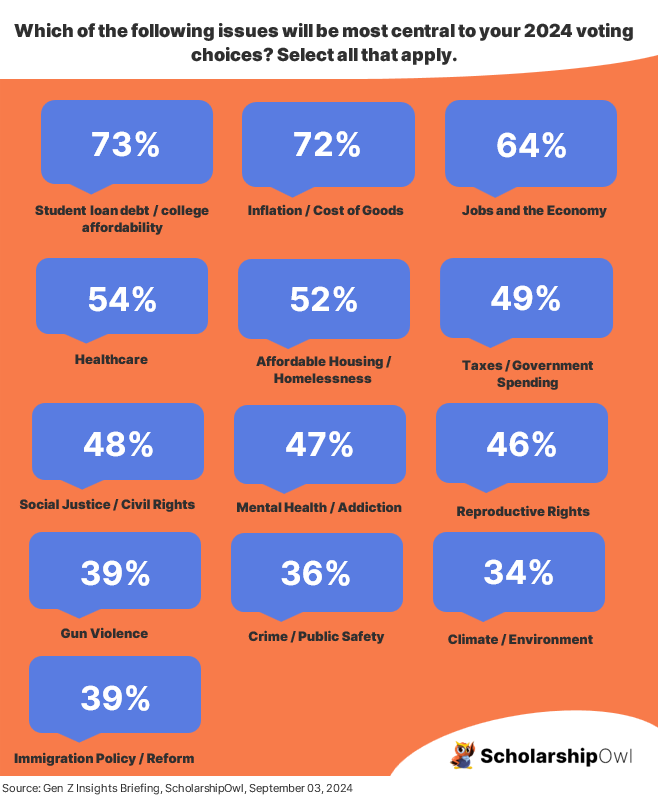
Would you be more likely to vote for a candidate that outlines a student loan reform policy?
- 84% said yes
- 16% said no
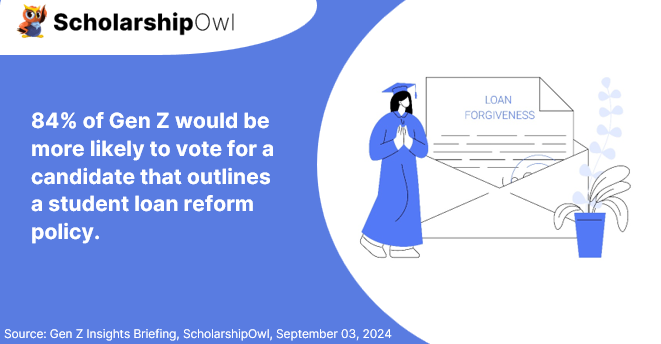
Do you think the current administration solved the student loan issue?
- 12% said yes
- 88% said no
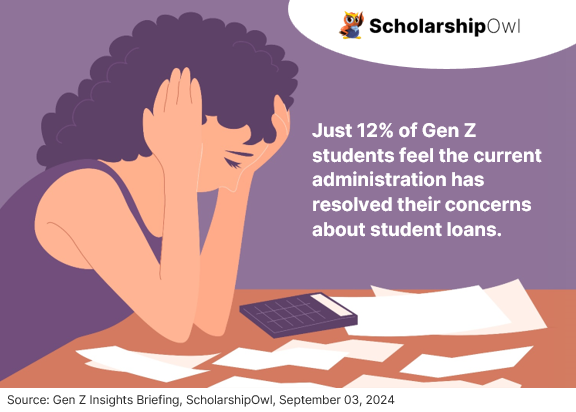
Political Spectrum Survey
Also in August 2024, ScholarshipOwl surveyed 13,657 high school and college students on the ScholarshipOwl scholarship platform to better understand where Gen Z sits on the political spectrum.
Among the respondents, 62% were female, 37% were male, 1.5% identified themselves as a different gender identity or preferred not to respond to the question. Nearly half (44%) were Caucasian, one-quarter (25%) were Black, 18% were Hispanic/Latino, 7% were Asian/Pacific Islander, 2% were American Indian/Native American and 5% selected “other” or preferred not to respond to the question.
Nearly one-third (31%) of the respondents were high school students, with the vast majority high school seniors; over one-half (57%) were college undergraduate students, primarily college freshmen and college sophomores; 9% were graduate students and 4% identified themselves as adult/non-traditional students.
Note that for this survey, we did not ask if respondents were eligible to vote in the 2024 election.
Which of the following best represents your political views?
For this survey, we asked participants just this one question.
- 56% said Liberal
- 44% said Conservative
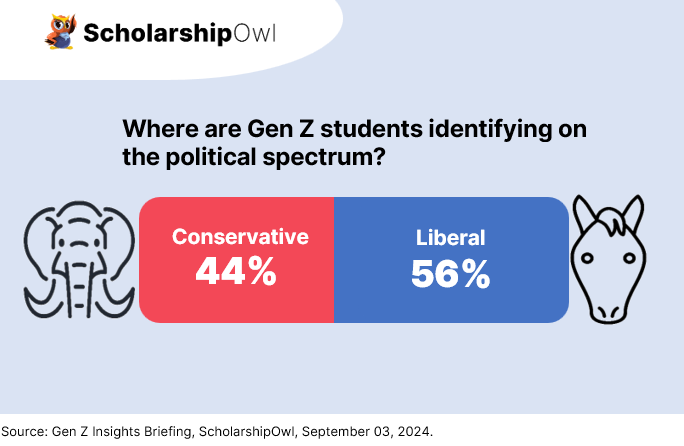
Key takeaways
The results of these surveys demonstrate that among eligible voters, Gen Z could in fact have a significant impact on the 2024 election, with 75% of eligible young voters indicating that they are extremely likely to vote in the 2024 U.S. Election, and another 18% indicating that they are at least somewhat likely to vote. Just 7% said that they were either not very likely to vote or that they do not plan to vote. Given the expected slim margins between the Harris-Walz and Trump-Vance tickets, the youth vote may well decide who wins the 2024 U.S. Presidential Election, as well as decide who wins the House and Senate.
With young voters having an important influence on the election, candidates may want to take heed and consider the issues that Gen Z cares about the most. More than half of our respondents indicated that student loan debt and college affordability (73%), inflation / cost of goods (72%), jobs and the economy (64%), healthcare (54%), and affordable housing / homelessness (52%) will be most central to their voting choices when they cast their vote in the 2024 U.S. Election. As such, candidates for the election may want to prioritize these issues when reaching out to young voters, and develop policy plans that respond to their concerns.
How can Gen Z students ensure they can afford college, regardless of the election results?
There are a number of steps that students can take to ensure they have an affordable path to college:
- Prioritize applying for scholarships with ScholarshipOwl. Apply for scholarships all summer long, and throughout the school year.
- Work part-time during the school year and full-time during breaks. Save your earnings to use for your college education.
- Submit the FAFSA every year for every year that you’ll be in college, beginning in your senior year of high school, and continuing to submit it annually until you complete your college education. The FAFSA opens on October 1st each year.
- When you receive your financial aid offers, compare them and focus on choosing the most affordable college. If your first-choice school offered you a less financial aid and scholarships than other schools offered, contact your preferred school to see if you can negotiate your offer to one that is more affordable for you.
- Always consider starting at a community college, which offers a truly affordable option – and don’t forget that community colleges also offer federal and state grant aid, and they also offer scholarships. So even if you are planning to attend community college, always submit your FAFSA and always apply for scholarships!
REMEMBER: Student loans should always be a last-resort option for paying for college. Focus on debt-free sources that will enable you to graduate without the burden of owing thousands of dollars for college! Focus on applying for scholarships and jobs, NOT loans, so that you can graduate debt-free. There IS an affordable path to college – for further information, and to start applying for scholarships, visit www.scholarshipowl.com.
